
臺灣非營利專業書評媒體。Openbook編輯部將提供原生報導,文化觀察,人物採訪與國內外重大出版消息。 https://linktr.ee/openbooktaiwan
"Topic" those days when he was eating at Wu Sheng's house, and "He's Still Young" trial screening ft. Wu Yinning, Jiang Yuda, Wu Jianliang, Zhou Fuyi
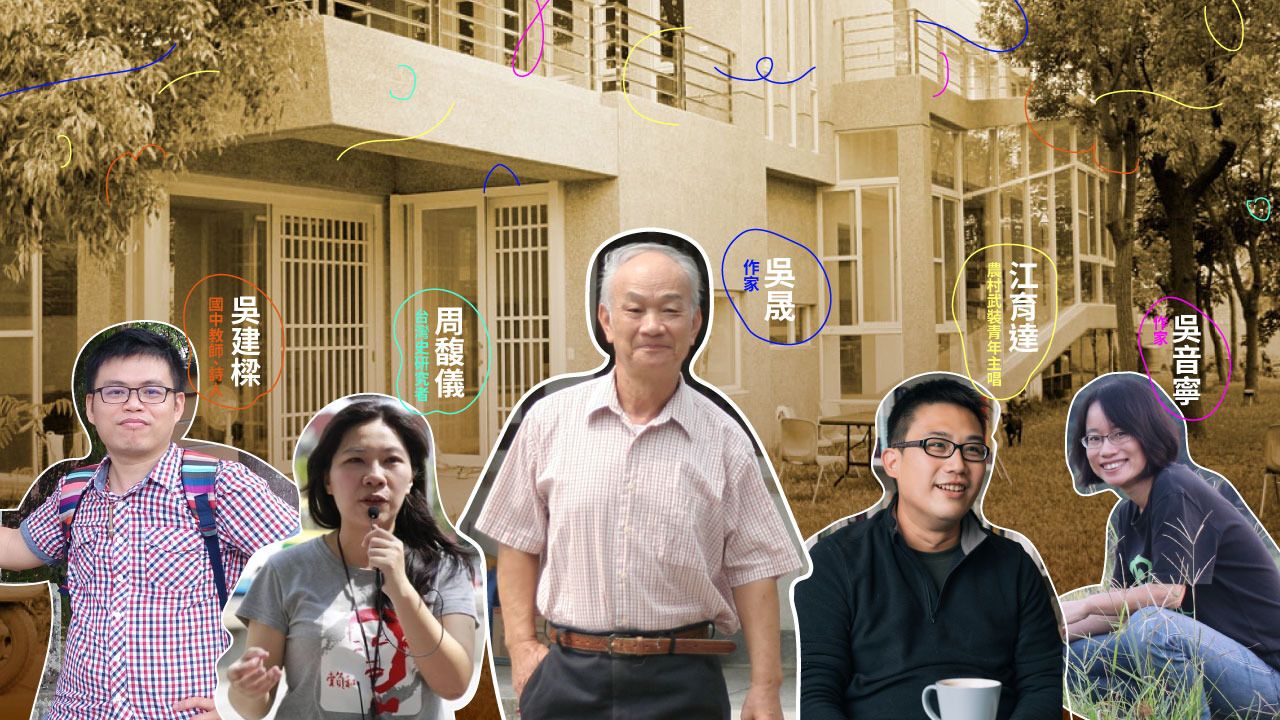
Written by | Wu Zhiliang (literary worker)
The documentary "Salgado's Gaze" shot by the famous German director Wim Wenders for the documentary photographer Sebastião Salgado, finally ended when the photographer returned to his parents' farm in Brazil, opened and constructed 's tree planting business, has so far planted more than 2 million trees. This important footprint of the tree-planting movement has so far been regarded as a beautiful talk by art workers and environmental advocates around the world.
In Taiwan, there is also a poet who does not stop writing work. He has devoted himself to the cause of tree planting for many years. Even in his old age, he still devotes himself to the environmental movement. He is Wu Sheng.
In order to accommodate the collection of tens of thousands of books, more than ten years ago, Wu Sheng built a single-family study in the Sanheyuan old family courtyard in Zhenliao Village, Xizhou Township, Changhua. The camphor trees planted by the author himself form a forest, and tables, chairs and swings are set up in the shade, and you can feel the cool breeze blowing from the adjacent rice fields. The study, which Wu Sheng calls the "tree house", is not only a space for the whole family to read together, but Wu Sheng often gathers and chats here with literary friends or environmental movement advocacy partners. The study of Wu Sheng's house surrounded by big trees is a place where the literary style gathers in a remote rural area.
Recently, the series "They Write on the Island" released a preview of the new work "He's Still Young", directed by Lin Jingjie, focusing on Wu Sheng's literature and life course, and United Literature also published two volumes of Wu Sheng's memoirs, "Literary Yijiazi". Openbook Reading Magazine specially invited Jiang Yuda, the lead singer of the independent band "Rural Armed Youth" who had known Wu Sheng for many years, Wu Jianliang, a poet and middle school teacher, and Zhou Fuyi, a Taiwanese historian, to watch the test film together. Wu Sheng's daughter and writer Wu Yinning were also invited to the meeting. Workers in different fields talk about the poet Wu Sheng they have seen.
Participants: Jiang Yuda (lead singer of the independent band rural armed youth) Wu Jianliang (poet and middle school teacher) Zhou Fuyi (Researcher of Taiwan History) Wu Yinning (writer)
➤PART1: The first time I met Wu Shengzhi, the teacher also knew music too well
Jiang Yuda: At the beginning, I met Mr. Wu Sheng, who had a great relationship with his son Wu Zhining. When I was in college, I worked as a drummer in Zhining's regiment 929 for a short time. Zhining had a group practice room in Taichung at that time, and we would go there every one or two weeks. Next to the group practice room is his room. I find it very strange. Why are there so many poems by Mr. Wu Sheng on Zhining's wall? At that time, I didn't know his father was Wu Sheng, and I didn't ask much. I was only a sophomore or junior at the time, but I felt very strange.
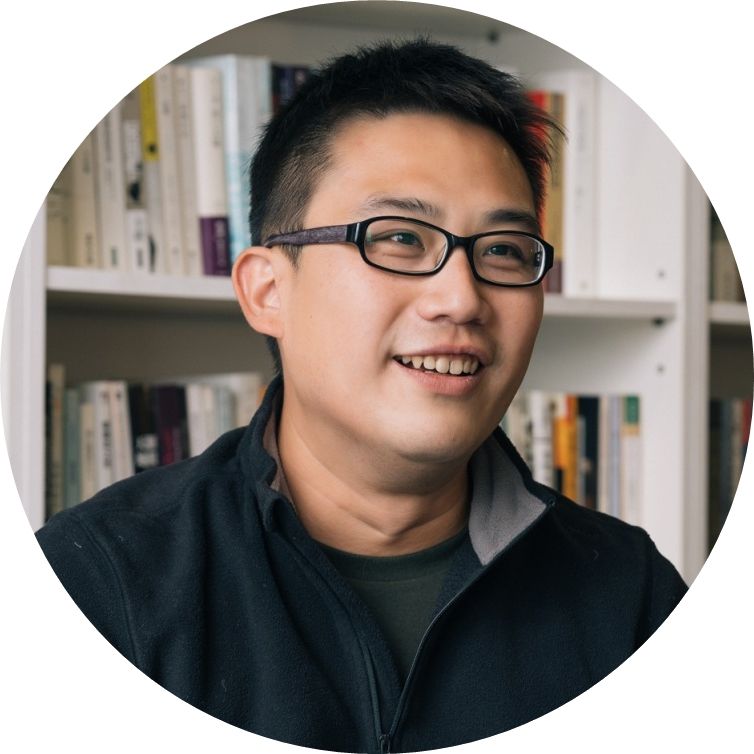
Once, because we were going to perform at the Ocean Music Festival, we were very active in training the group. During the group practice, Zhining said, "Ah, my parents and my mother will come later." I was a little nervous because it was the first time I met someone else's parents. After practicing a song, the two of them went into the group practice. room.
Teacher Zhuang Fanghua (Wu Sheng's wife) began to point out, "I feel how the music just now should look like, how do I think it sounds..." I think it is super strange, how can someone's mother understand music so well, it's incredible! During the break, Zhining came to introduce me: "This is my father Wu Sheng." I thought to myself, "Oh my God! Your father is Wu Sheng!?"
Because I am not a person who likes to study very much, and I do not have much research on literature, but I have always remembered the texts when I was a child, and this person actually appeared in my group practice room when I was in my 20s. He is also the father of the lead singer of my orchestra ? !
➤Left and Right, which one is it? Chen Yingzhen bumped into the "Left Wing. Third World. Taiwan" banner
Zhou Fuyi: The first time I met the teacher was in 1996. At that time, I was studying in Taichung Girls’ High School. Because the textbooks rarely knew about Taiwan or Taiwan-themed content, we founded the Taiwan Culture Research Society. In October of that year, we had a joint cadre training with Changhua High School and the Taiwan Cultural Research Society of Taichung No. 1 Middle School. Because Changhua High School teacher Lu Xingzhong was very familiar with Wu Sheng, he invited Wu to share. He was one of the few textbook writers we could see at the time, and most of the textbook writers were invisible.
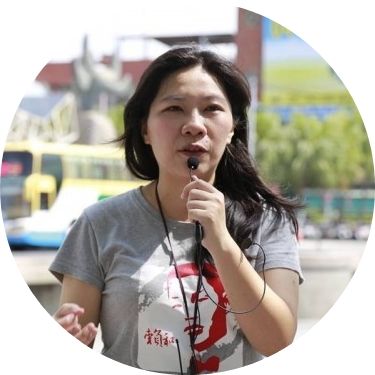
So far, I am still deeply impressed. The teacher shared two poems: one is "Beast Soul Monument", written 228, that is also the first time I have seen a Taiwanese poet write 228 in poetry: the other poem is "Grade" is a love poem written to him, a young girl from Pingtung Agricultural College and his current wife, Mr. Zhuang Fanghua. There is a great contrast between these two poems. The poets who wrote 228 also wrote love poems.
Later, I became familiar with it because I went to study in Taipei when I was a freshman. The Lai He Foundation started the Lai He National Taiwan Literature Camp for high school students in 1999. It was the first Taiwanese literature camp for high school students in China. Camp director, I am the general summoner. We brought back some of the Taiwanese Literature Club partners who were in college at the time of the First Middle School and Middle Girls' High School as staff members.
Because of Wu Sheng's relationship, we have the opportunity to invite Chen Yingzhen and Zeng Jianmin, who are regarded as relatively leftist writers and cultural figures, but at the same time there are also Taiwanese and independent Taiwanese literature researchers, such as Teacher Yang Cui, Teacher You Shengguan. This is a meeting of the leftists and the Taiwan independence faction. The theme of the high school camp team was full of dazzling, called "Left Wing. Third World. Taiwan".
At that time, at the Xingnong Villa in Taichung, a large banner was made and hung down from the top floor of the villa. When Lv Xingzhong and Wu Sheng took Chen Yingzhen into the park, Chen Yingzhen looked up and saw the "Left Wing. Third World. Taiwan" banner. Suspended, momentarily excited.
I was not aware of the complex entanglement between leftists and independents. Later, during the process of getting acquainted with Mr. Wu Sheng, he gradually clarified his literary qualities and interpersonal relationships. He interacted with leftists such as Chen Yingzhen because he cared about the grassroots. But the proposition he agrees with is the land of Taiwan, so there are many different things in his literary works.
|About the left-wing and right-wing, Wu Sheng once wrote in the article| "I participated in a poetics seminar by chance and met many famous academics and literature professors, and talked about the rise and fall of various poetry societies, the rise and fall of various schools, and the grievances between poetry societies and poetry societies. Quietly inquired: In those times when the associations were building up momentum and turbulent, why didn't you see your trace? I roughly know that when I was young, there was a group of peers who danced dragons and drums, instigated the right wing with high spirits, and created waves of dazzling waves. Right-wing, left-wing, right-wing, left-wing, and there are even people who match that genre and this doctrine from time to time, and quietly change it according to the current situation, confusing countless youthful eyes. I can tell you frankly that I have lived in villages for many years, sweating silently, and even picking up feces and carrying dung to move compost. Under the quiet lonely lamp in the countryside, the footprints of the villagers, the smell of the land, the long branches and leaves of the crops... are all projected into the poems I actually painted. If I have to explore the clear consciousness of my poems, I only know that every poem is connected to every inch of the island of Taiwan. "—From Wu Sheng's "Poem Title", "Literature Yijiazi 2" (United Literature Publishing), p. 231.
➤Being beaten by a middle school teacher: <Load> is written about you, but you still spell it wrong
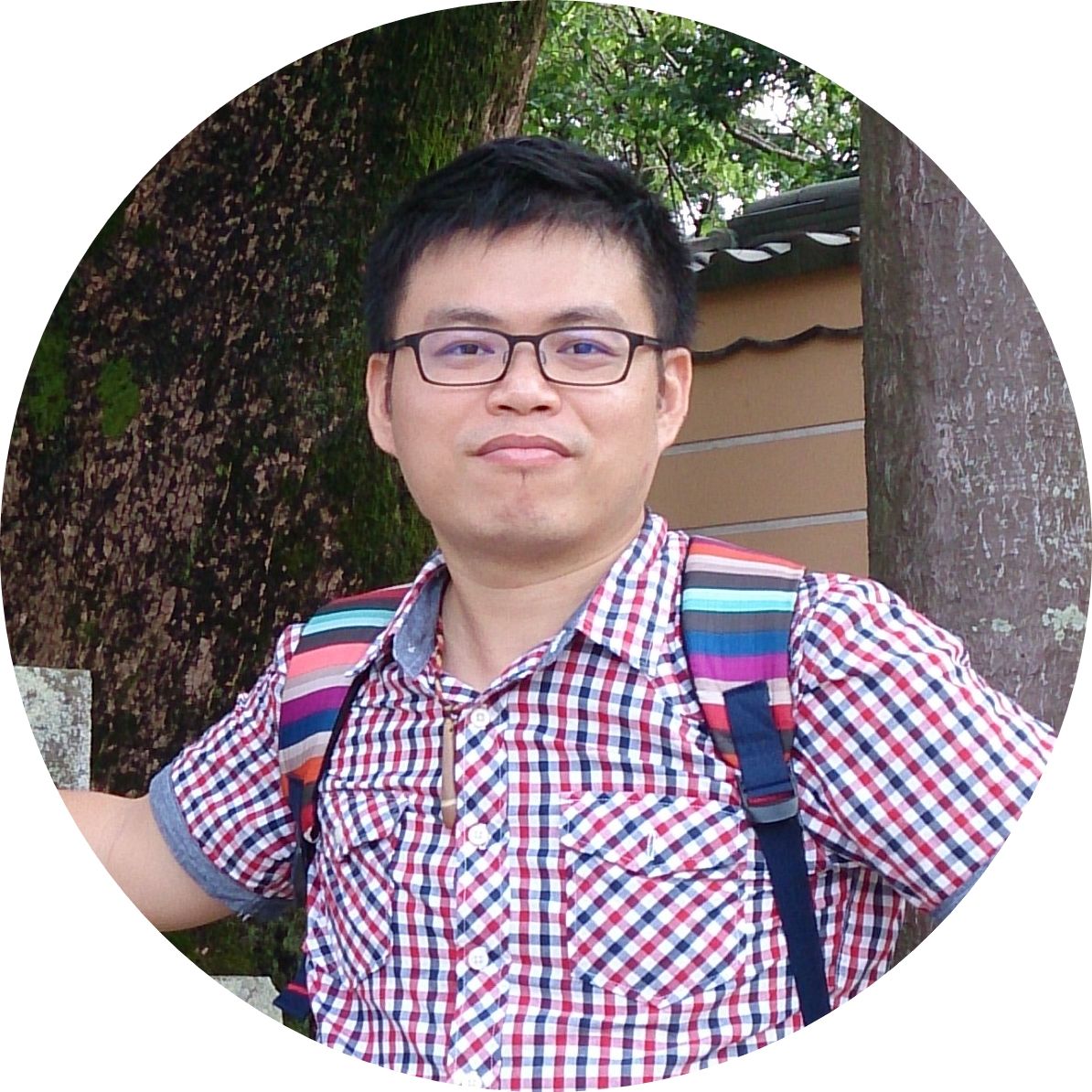
Wu Jianliang: In 2012, when I was writing a dissertation in the research institute, the theme was Mr. Wu Sheng and his social practice. Although I am also a native of Changhua, I am ashamed that I have never met Mr. Wu. Instructor Xiang Yang gave me Mr. Wu’s phone number and asked me to find opportunities to visit and add interviews to the thesis. That day, I called the office to make an appointment, and I quickly got the approval. That afternoon, I was going to take a train from Taipei to my home in Changhua and Lugang. I changed trains at Taichung High Speed Rail Station. I saw a very familiar person. It was very coincidental. Is the writer Wu Sheng teacher? Although I haven't seen the person in person, but I've seen the photos many times, it doesn't make sense to admit my mistake, so I bite the bullet and start a conversation.
The teacher was also surprised that it was such a coincidence. We chatted all the way from Xinwuri Station of the Taiwan Railway to Changhua Station, and completed this pre-conference meeting. Opportunities are so wonderful. The magnetic field of literature pulls us together. Sometimes when Teacher Wu introduces me to others, he will also talk about this "train adventure".
Wu Yinning: Talking about Mr. Wu, it is difficult to describe in a few words. However, there are some things that can be brought up to make everyone laugh. In the middle of our country, "Load" was recited. At that time, it was popular to dictate and memorize texts. If you miss one or two words, you will be beaten. I still remember that when I wrote "Load" by dictation, I made a mistake and the teacher said, "This poem written by your father should be about you, but you still made a mistake!" Wrong.
The exam will also test the grammar of "Load", and I don't know if it's an inversion sentence or something. When I went back and asked Teacher Wu, he replied, "I don't know! What exactly is the grammar of this sentence?" Therefore, although the poet wrote poetry, although grammar was not considered, it still became a question for the Chinese class.
➤Smoked yellow walls and party magazines
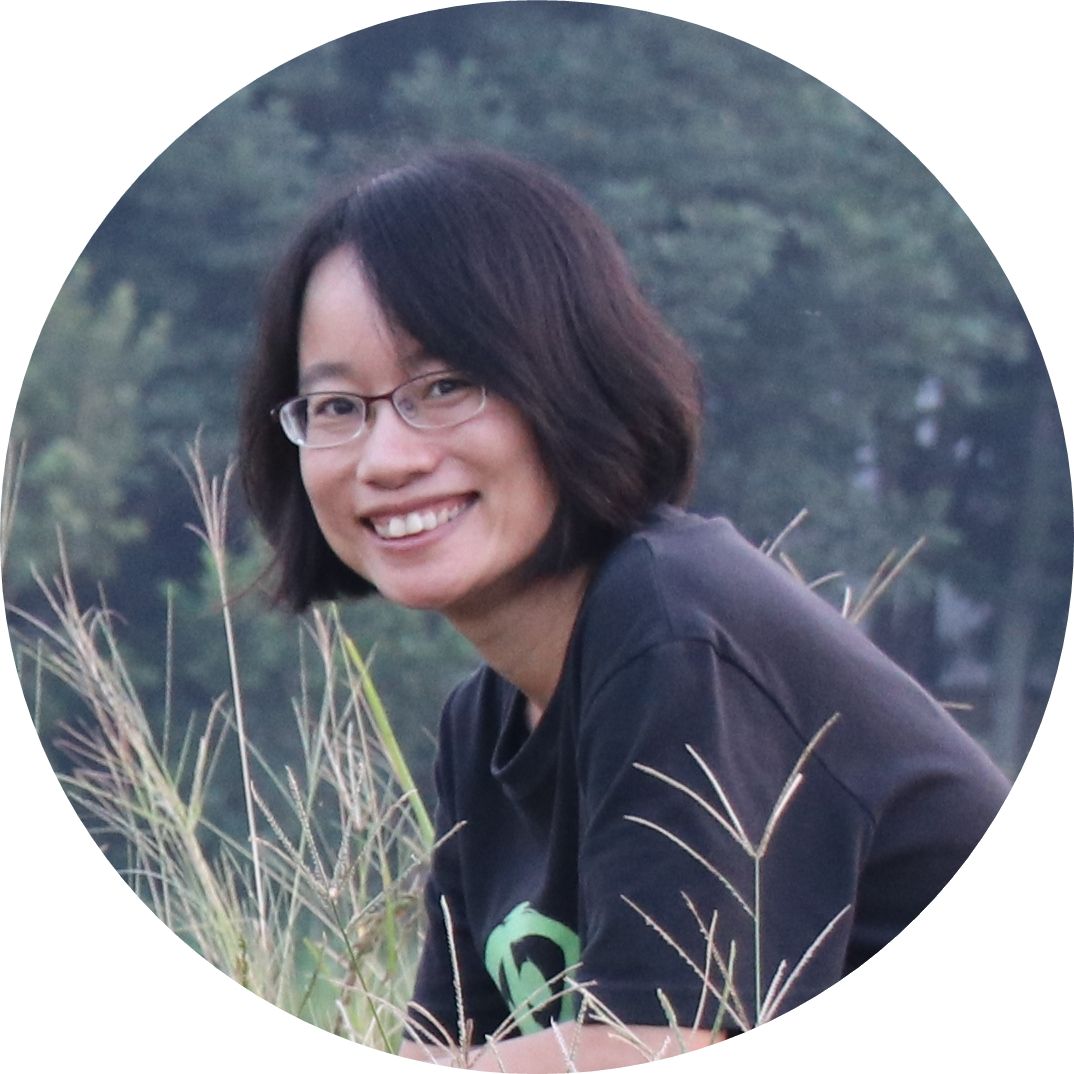
Wu Yinning: The books at home, of course, have a great influence on me. Mr. Wu has a study, not the big study that everyone sees now, it was built later. His former study was in the corner of our tri-heyuan. He doesn't smoke anymore, but he smoked when he was young. The walls of the study were originally white, and he smoked until the walls were yellowed. In addition to the desk, the study room is full of his books, which is the space where I grew up.
Since the fifth grade of primary school, I often went into the study room to read. What attracted me the most was the “Party Foreign Magazine” that Mr. Wu placed at the bottom of the bookcase. I always read those non-Party magazines. I especially remember that the theme of a certain episode was "Black Whirlwind Luo Dayou". I grew up reading these magazines, and these things became my nourishment.
Of course, all kinds of people would come from time to time in the family, including Chen Yingzhen, Song Zelai, and Lin Shuangbu, so that more young people often came and went in the Wu family's courtyard.
➤PART2: Who said that the revolution is not a dinner party, those days when we were eating at Mr. Wu Sheng’s house
Zhou Fuyi: Every time I go to Teacher Wu’s house for dinner, I’m talking about a major task, which is to “revolt”. Teachers sometimes think of what activities to do, and they also ask us young people to discuss them. Earlier, it was mainly related to the work of the Lai He Foundation. Later, there were also partners of the "Taiwan Rural Front", or some young people who were more involved in public issues, such as Xu Guanze's generation in the documentary, or Changhua Shuangxi. Association of young people, many different generations. Most of them are related to social movements, and a few are related to literature.
Jiang Yuda: I am basically a singer. I can follow closely. When everyone is discussing an issue, it is enough to have a general understanding of the issue. The main responsibility is to sing, and I don’t need to stand on the stage to discuss it, so I mostly go to the teacher. Home is usually more joyful and happy. Around 2010, the Agricultural Front would also sing at Mr. Wu's house when organizing activities, mostly discussing issues related to Guoguang Petrochemical and Engineering. I rarely eat out with my teachers, mostly in their kitchen or under a big tree.
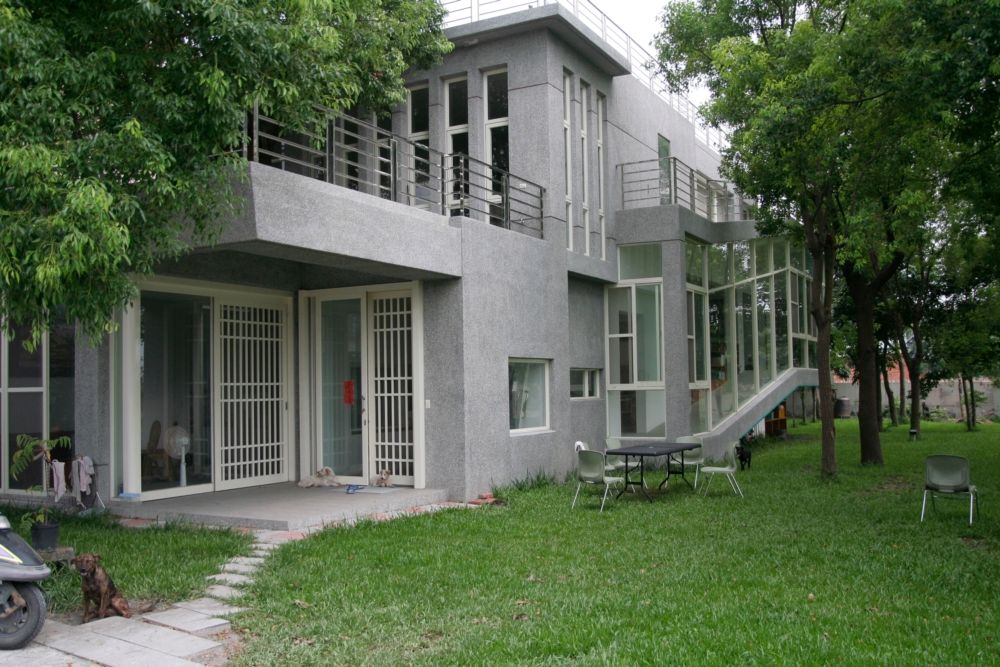
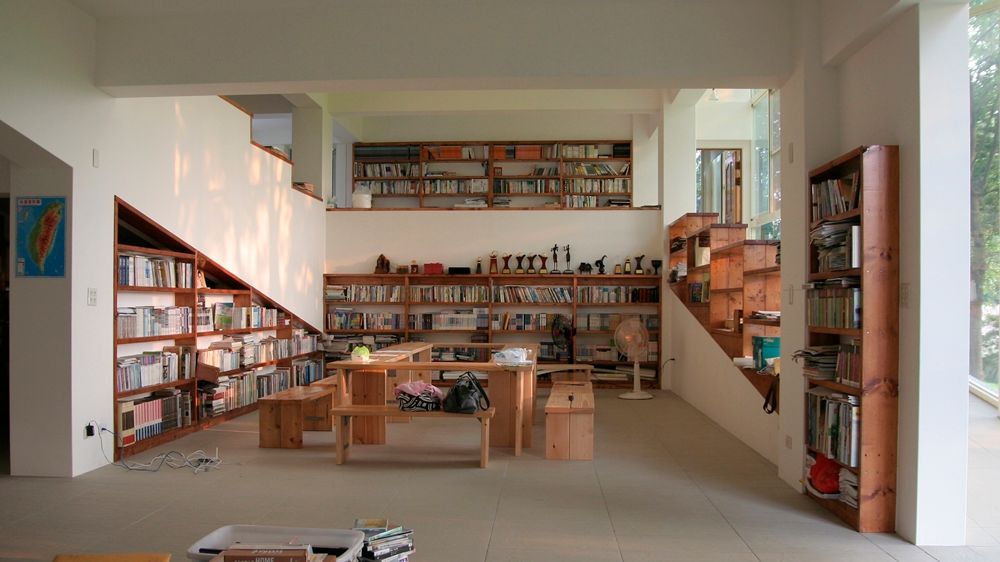
➤Poet and local gourmet, used to tutor after school, and now help the student restaurant to gain popularity
Wu Jianliang: Now I go to Xizhou to find teachers about two or three times a year, and I go with my senior sister Li Guimei and poet Chen Yin. We talk about literary issues or gossip in the literary circle. When it comes to eating, most of them eat out, such as Honglin Coffee, but Honglin Coffee seems to have closed its business.
Wu Yinning: It's like Teacher Wu's exclusive kitchen.
Wu Jianliang: Sometimes I also talk about stories from outside the party, and I also talk about planting trees. For example, these days everyone is rushing to plant pine trees. In fact, Mr. Wu has always been very opposed to it. I will also go to Tianwei Landscape Cafe "Jiangyuan", and eat a lot of good ingredients with the teacher. The most amazing thing is probably Yang Ge's mutton stove, which is fresh and not stinky. The manager is a student of Mr. Wu Sheng.
In fact, Mr. Wu Sheng's roles are very diverse. Except for the so-called peasant poets, social activists, or respected teachers in the local area, they are all a combination of his identities. There is a feeling that people will respect him wherever he goes in the countryside. , so when we eat together, we often encounter that the boss is a former student. I think Mr. Wu is actually very happy that the students have a successful career, and he can also introduce friends and help bring popularity.

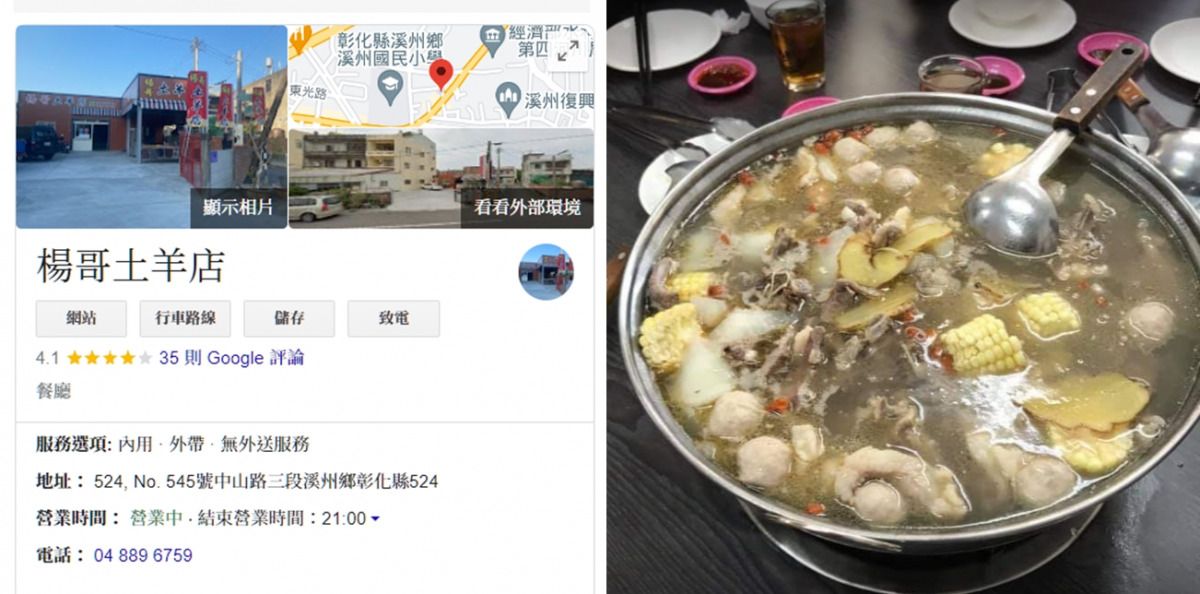
➤Rural women should also have their own room (playing the cello or writing is fine)
Wu Yinning: Why did Jianliang come to eat outside, and Ada and Fuyi used to eat at home before? Who cooks when Ada and Fuyi come? Do you remember?
Zhou Fuyi: Is that Teacher Zhuang?
Wu Yinning: Yes, it is Mr. Zhuang who cooks. Mr. Zhuang has not liked cooking very much recently.
Zhou Fuyi: Recently, Yinning was cooking.
Wu Yinning: Recently it has been changed to I want to cook.
Wu Jianliang: Yes, yes, last time I went to cook with Yinning.
Wu Yinning: Teacher Zhuang feels that cooking is really a little tiring. In the past, when many people came together, Teacher Zhuang had to spend a lot of time preparing. She is now more interested in playing the violin and cello. In her free time, she plays the cello by herself and also takes cello lessons.
Zhou Fuyi: I talked to Teacher Zhuang two years ago and suggested that she should also start her own creation. She was all farming and had little time. At that time, because there was still a space in Chunyuan, I said to Teacher Zhuang, "Otherwise, you can learn from Woolf and have a room of your own." She mentioned that she wanted to do a series of writing. , with "rural women" as the object of writing. When watching the documentary, Teacher Zhuang read her article, and I thought of this part. In fact, I really hope that Teacher Zhuang can also have her own time and space to do her own creations.
➤PART3: The most impressive clip in the documentary "He's Still Young"
Wu Jianliang: The most profound segment is actually not a single segment. When watching this film, you can see the whole of the family's emotions. It is not so much a documentary of Mr. Wu, but rather "Mr. Wu Sheng and the forces behind him". The whole family bravely faces the external ups and downs, whether it is farming, writing, politics, or some simple life, showing the close connection between the family.
At the beginning of the film, Mr. Zhuang was thanked, and in the middle, he returned to the tree garden "Pure Garden" named after Mrs. Wu Sheng's mother, Ms. Chen Chun. The teacher cried so much that she couldn't help herself. These clips made me feel the support of family and family, so that Mr. Wu could charge in front of the battle. The main axis of "family is the closest" moved me. Even in the later "Northern Farmer's Wind and Cloud", I just wanted to clarify and breathe a sigh of relief for my family. In the show that this is not the birth of a person, Teacher Zhuang is an indispensable and important role.
➤ Friendship across provinces: Wu Sheng and Yan Xian
Zhou Fuyi: There are several episodes that left a deep impression on me. What I felt the most was that Mr. Wu came to visit Yanxian in Canada. I seemed to see Mr. Wu returning to the starting point of his own literature. In 1972, Yan Xian saw the power of the countryside in Mr. Wu's "Impression of My Hometown" series of poems, and his works were published in "Little Lion Literature" with a considerable amount of space. What I saw was a literary exchange across provinces.
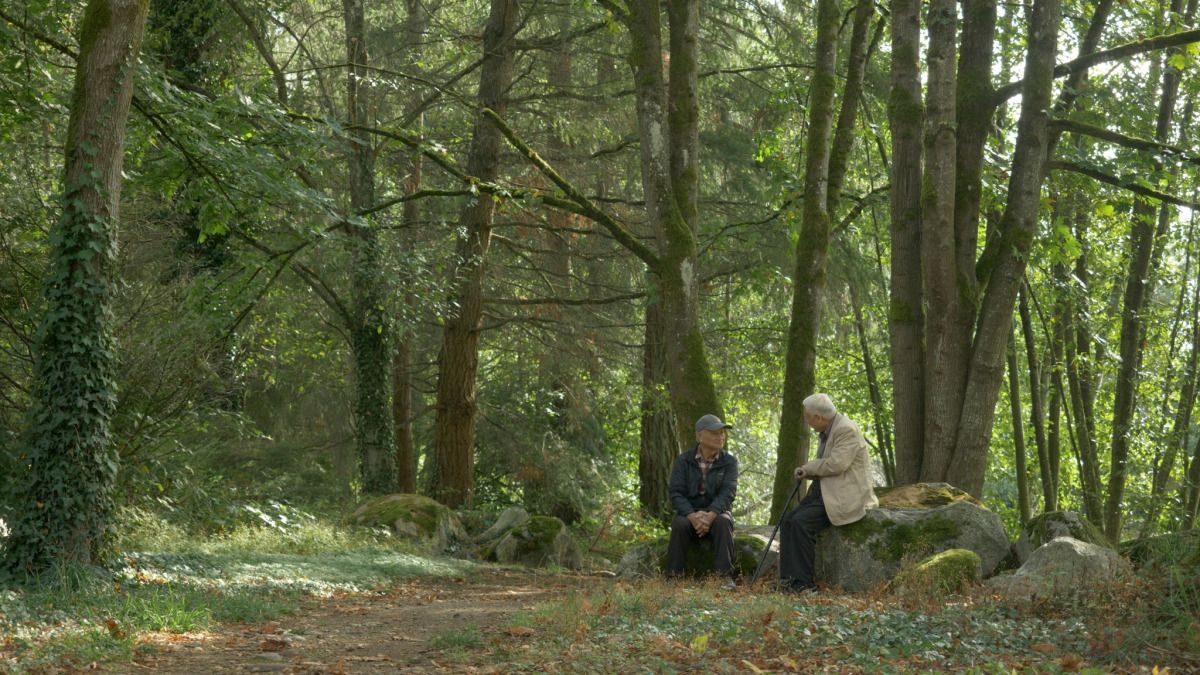
Wu Jianliang: In the era when modernism was the mainstream, Yanxian was able to adopt and publish local poems at length, which really stimulated and affirmed Mr. Wu's creation. If it is said that the two of them are different in the political spectrum, it is mainly because of their backgrounds. One is a native of Taiwan's rural children, and the other came to Taiwan with the army.
As Fu Yi mentioned, Yanxian is more right and traditional, while Wu Sheng is more left and independent. But I think their appreciation for each other is genuine. As a newspaper editor, Yan Xian has the responsibility of being a gatekeeper, but his artistic vision transcends times and backgrounds. He can discover the truly beautiful parts of his poems, not just model anti-communist patriotic works.
When Yan Xian himself was writing, he also wrote about the landscapes and scenery of his hometown in many backgrounds, such as "Salt" and "Red Corn", and the famous "Abyss" was also a work of veiled protest—Neither was Yan Xian itself. Pure obedient card, perhaps such poets can see the vitality of local poetry and its characteristics. Maybe Yan Xian will feel that it is just that the time and space of history and works have alternated. In Taiwan's native land and in Wu Sheng's poems, you can also read those pure and beautiful parts, which do not involve each other's political stance, just appreciate each other. [Wu Sheng once wrote in the article about the friendship with Yanxian☛]
➤The poet's deep affection, dedicated to the hand that accompanies a lifetime
Zhou Fuyi: There is another scene I like very much. Teacher Wu goes back to the room where he lived in the writing class in Iowa in 1980. After reading "The Mood of Laundry", Teacher Zhuang's eyes were full of admiration. The two sat by the window. The teacher stuttered a little when he finished reading, showing that he was very caring and caring about his family.
This documentary also recreates the process of Teacher Wu's completion of "Notes on Zhuoshuixi" with the company of Teacher Zhuang more than 20 years ago, re-examining the changing path of Zhuoshuixi, and re-examining the land of Taiwan, which is the core concern of teacher's literature.
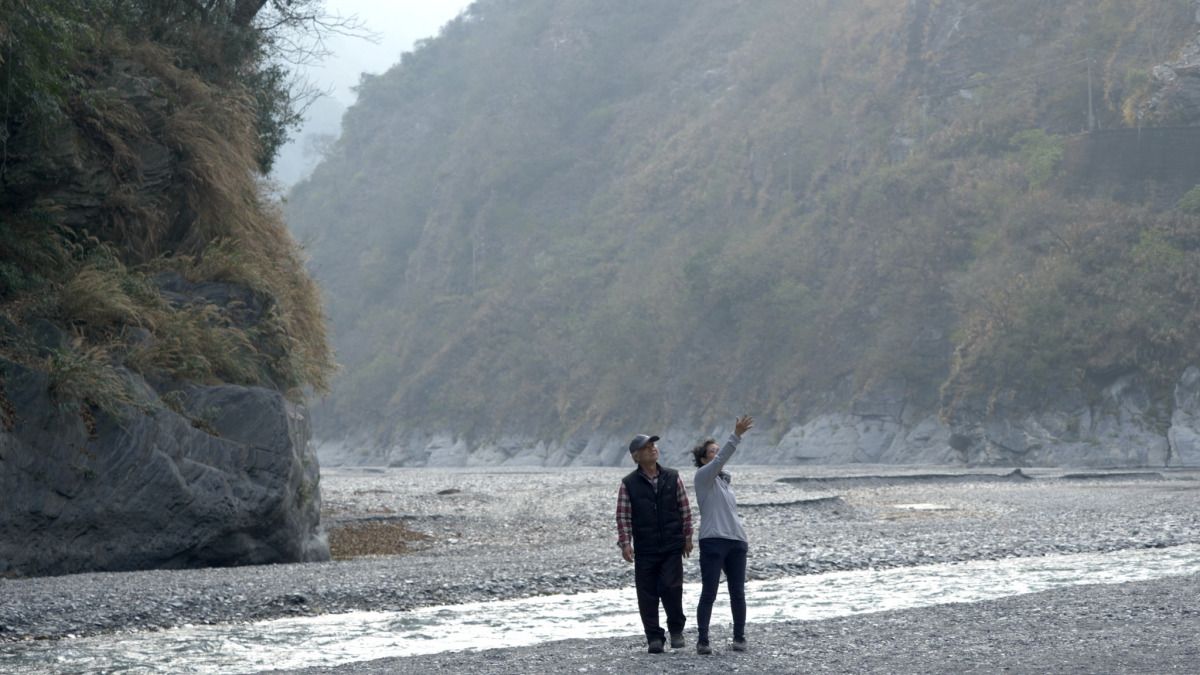
Jiang Yuda: It may have something to do with my own marriage and childbirth in the past two years. The first poem I read aloud in the documentary was "Load". After reading it, I suddenly realized, God, I have re-understood this poem, whether it stayed in the city or returned to the countryside. Struggling, now a father, I fully understand.
Seeing the teacher reading poems to Teacher Zhuang in the Iowa dormitory, although the husband and wife are old, but Teacher Wu reveals the feelings of a boy, I will be moved. Mr. Zhuang also told him, "My palms are still tender." But Mr. Wu insisted that his hands were old. I wanted to say, "Teacher, you can't do this. Even if a woman is old, I still hope you can tell her about her. The hands are tender. I just found out, teacher, that I am better than you now.”
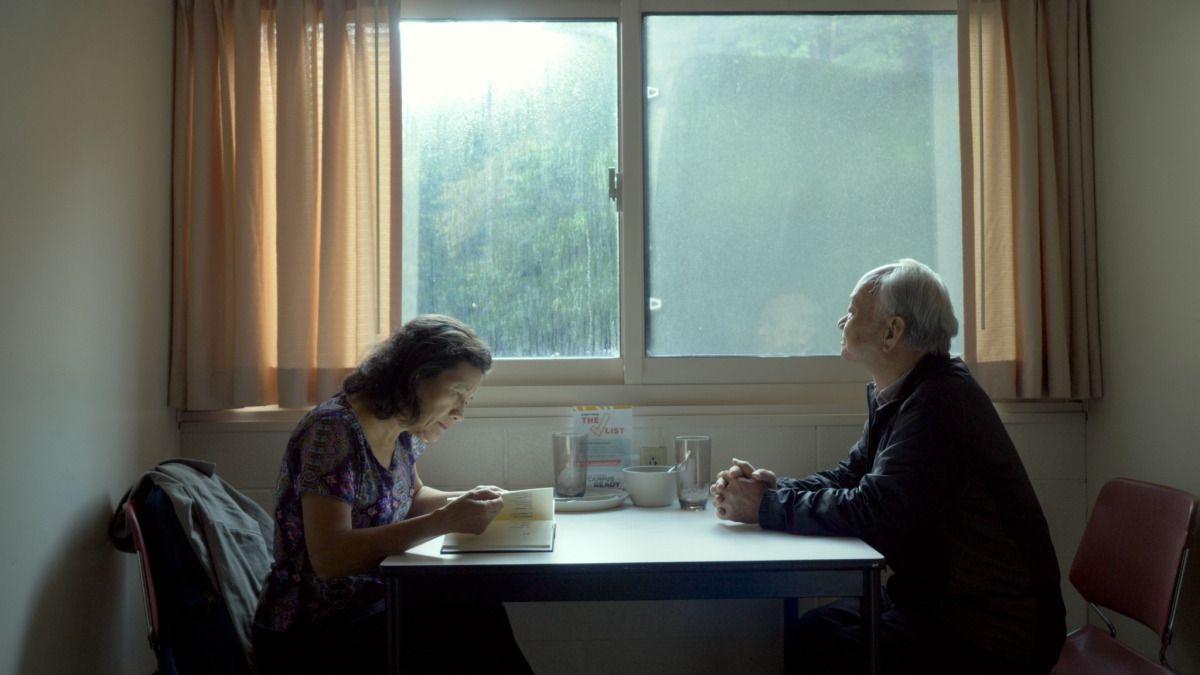
➤PART4: Put a memory in the documentary
Wu Yinning: Probably in the year of Anti-Guoguang Petrochemical, in September, on Teacher Wu's birthday, we usually set up a long table in the yard or tree garden and invite some friends to have dinner. A few days before my birthday, Teacher Wu asked me, "Have you made an appointment with Fuyi?" I replied, "Yes, I have an appointment with Fuyi." Then he asked again, "Is Fuyi coming?" "It seems that Fuyi is here. I'm a little busy with work, so I'm not sure if I can come here." Before dinner, he said again, "You have to call Fu Yi." I wanted to say that I had already reminded me.
That night, the guests sat down one after another, and Mr. Wu said again, "Fuyi? Why haven't you come yet?" Before Fuyi came all night, Mr. Wu was depressed. Everyone was eating, and he had a bitter face. He also said, "Fuyi didn't come, what's there to celebrate?"
It was about 8 or 9 o'clock in the evening, and Fu Yi finally hurried from the workplace to Xizhou. As soon as she came in, as soon as Mr. Wu saw Fu Yi, she immediately said, "Fu Yi, you are here. Now we can go into the room and open the door. The anti-Kunikwang Petrochemical meeting is over.”
He needed Fu Yi to come, not to celebrate his birthday, but to invite everyone to a meeting to discuss anti-national light petrochemicals. Fu Yi worked hard to come to the birthday party at nine o'clock in the evening, and immediately entered the room for a meeting. Fuyi, do you remember?
➤ Persistence in anthologies and sports (not just because of the relationship between Virgo)
Zhou Fuyi: I remember, I will never forget it. It was the beginning of September 2010. I was the CEO of Laihe Foundation. Mr. Wu hoped that Laihe Foundation could connect with the art and literature circles against the national light and petrochemical industry. Yin Ning called me and said, "Teacher's birthday, I want to invite everyone to dinner." But because I was working on a case, I also called Teacher Wu to explain, but Teacher Wu hung up halfway through the conversation.
Wu Yinning: It means that Fu Yi didn't come, there is nothing to celebrate her birthday.
Zhou Fuyi: Yes, yes, he didn't mention anti-national light petrochemical in advance. It was after seven o'clock in the evening. I was still working overtime in the office. Yinning called and asked me when I would be there. I said that I will rush over now. Only when I arrived at the scene did I know that it turned out to be a work meeting against Guoguang Petrochemical.
I also thought about my teacher's cancer. One year, Zhining made a literature and music album and released several songs at the teacher's house. Later, Teacher Wu wrote a "Farewell". Soon after, he was diagnosed with cancer.
At that time, Mr. Wu, Mr. Yang Cui and Mr. Lu Hanxiu compiled a literature reader for Taiwanese teenagers. Teacher Wu had just finished the surgery, and his vitality had not recovered, so he asked us to discuss at Teacher Lu Hanxiu's house. I found about two or three hundred selected articles on cultural discussions and brought them to the scene. Teacher Wu had just been discharged from the hospital. After looking through it, he raised his head and asked me, "That's all? Is there anything else?" I replied, "Teacher, there are already two or three hundred articles, do you want more?"
I can feel that Mr. Wu has an inexplicable persistence in pursuing the best. I thought to myself, the teacher is already like that, do you want to make yourself more tired? But I didn't say it because he was in really bad shape. On the way back, I chatted with Mr. Yang Cui, and we both found Mr. Wu’s inexplicable insistence that we must do it to the end.
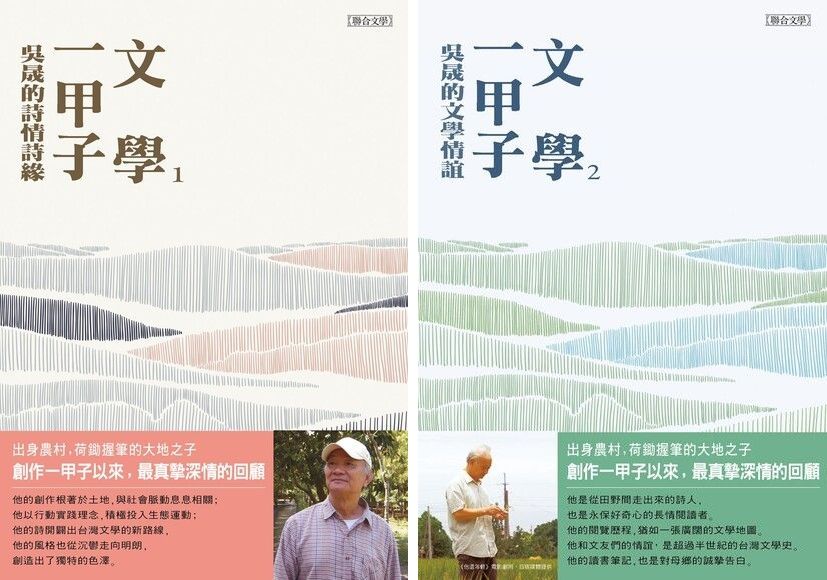
This insistence was later seen in Anti-National Guang Petrochemical. Because of the large scale of the movement, Mr. Wu believes that it is necessary to connect the arts and literature circles. He pulled out a thick address book, made a list, and suggested that we contact them one by one. We made nearly 200 phone calls, and Mr. Wu also found a lot of literary friends who he knew. Please come out and support the anti-Guoguang Petrochemical Company, including Zheng Chouyu, who used to be less vocal about environmental issues. This inexplicable persistence is what impressed me.
Wu Yinning: Well, Virgo.
➤ Very good at talking but not writing social papers, BTW is very good at coaxing children
Wu Jianliang: I once brought my child to Mr. Wu Sheng. At that time, when he was less than one year old, Mr. Wu Sheng hugged him. It was really like a grandfather hugging his grandson. The scenes of holding Yinning when she was a child or holding her granddaughter. I feel like it is passed down from generation to generation, including our good friends and children. Mr. Wu is also very good at coaxing children.
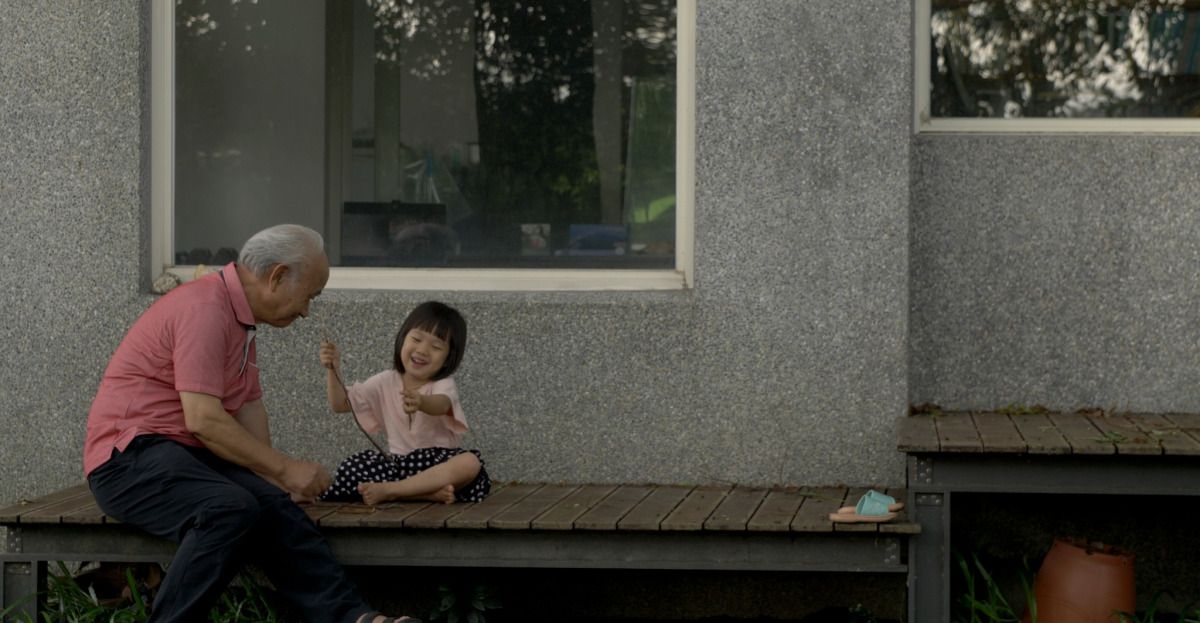
The pictures that I want to put in the documentary, and Mr. Wu's courage to refuse. Persist in important things, be enthusiastic but not the kind that refuses to come, there will be screening and rejection.
[About rejection, Wu Sheng once wrote in the article] "From about the mid-1990s, the cultural centers of various counties and cities in Taiwan began to attach importance to "local" literature, planning and publishing collections of works by county and city writers, each volume ranging from three to five. Some counties and cities have now Several volumes have been published, and the number is considerable, and many local writers have been "snared". As far as I know, most of them are lesser genres and collections of some older writers. Since there is a cultural center willing to publish it on its behalf, take the opportunity to organize it and compile it into a book. Although it is not for sale in the market, at least it can be kept as information to avoid loss. The Changhua County Cultural Center is of course no exception and has also published a number of works. Around 1995, the director of the Cultural Center, Yang Suqing, personally invited her to express her wish to publish a collection of my works and works of criticism. I believe in his sincerity and appreciate his kindness even more. I only make one condition, that there should be no preamble of any administrative bureaucracy. The embarrassment of the director of the cultural center can be imagined, and this matter will never be mentioned again, but it has caused me to reflect a lot. In the collections of works published by many county and city cultural centers that I have collected, the frontispiece of each volume must be "Preface by the County Chief", followed by "Preface by the Director", without exception. This is a typical product of Taiwan's bureaucratic culture..." --- Jiezi Wu Sheng, "Rejecting the Preface", "Literature One Jiazi 2" (United Literature Publishing)
Wu Yinning: In fact, this is true, but in fact, he often refuses to come to reporters or most people. Like in the documentary, when facing a photojournalist, I warned him beforehand that he should not be interviewed by any media. He had to say to the reporter, "It's really rude, I'm sorry, please be considerate of me." Teacher Wu is In this way, very hospitable, he is usually not very rejecting people.
➤The time allocation technique of the creator of Mr. Wu's love tutoring class
Jiang Yuda: Because Teacher Wu is one year older than my father, my father had passed away when I met him, so I feel that Teacher Wu always likes to ask me some questions that my father would ask. When he was not married, he often asked, "When will we tie a knot?" If something went wrong emotionally, the teacher would also start talking about his love story when he was young. At this time, the teacher will share a lot of fun and emotional management skills like a child in his heart.
I didn't want to go to Mr. Wu that day, but because I was in a low mood, I wanted to say that it would be better to go to Wu's house. Teacher Wu asked me, "I have heard people say, is there something wrong with young people's relationship recently?"
He shared with me, an art worker, how to make transitions and decisions in creation, family and children. He said that unless I work alone for the rest of my life, I will always have to face family and children. "This has to be clearly distinguished and distributed rationally. After accumulating a period of time, I will retreat and start creating, but once I come out, don't think about it. My heart should be completely given to my children, my wife, and my family.”
[Wu Sheng once wrote about the time allocation of creators in the article☛] "I often hear some 'adults' sigh that one generation is not as good as the other, and think that compared with their generation, the 'young people of this generation' lack ideals, how can they not endure hardships... In fact, the backgrounds of the times are different, and each has different problems to face. Yes, each has different ideals to be practiced. Although the "young people" of each era have commonalities in specific time and space backgrounds, they also have their own differences, and they are not necessarily reduced to one kind of appearance, one kind of "model" as in general discussion. Compared with today's young people, the most important characteristic of these young friends I know is of course their love of literature and reading, but they are not only in literature. What makes them different from ordinary "literary youth" is that their literature Enthusiasm, often covering social observation and caring. I have worked with them to participate in some social affairs and understand their ideals and practical power. But I got to know them through literature after all, and I fully felt their literary talent, and I always hoped that they would give full play to their creative potential. However, such social embrace occupied their main life activities and greatly crowded out literary creation. mind. They don't seem to care much about their own names and things, and they never work hard. In fact, in the process of democratic development in Taiwan, I don’t know how many talented literary talents have been absorbed in each era, and they have been directly involved in various social movements. Many literary and artistic youths I know have typical examples, such as Liao Yonglai, a politician, and community workers. Feng Xiaofei, Lu Siyue, Li Ji, Ye Zhizhong, Chen Wenbin of Video Documentary..., their literary talent and mind, as well as the profound voice of the land, are the most common "mainstream writers" and the most lacking quality in popular works, but they are practiced in society. In the middle, it gradually became alienated from literary creation. Even though I often "spur" them in lamentation, they still prefer to practice directly. I seem to be able to foresee that the younger group of friends are likely to "follow in their footsteps" and have no time to devote themselves to creation in social participation. "—Jiezi Wu Sheng, "The Voice of the Land—My Young Friend", "Literature Yijiazi 2" (United Literature Publishing), pp. 249-250.
Mr. Wu mentioned a book to me, The Art of Love by Fromm, and asked me to go back and read it. I bought it as soon as I got home, and not only read the whole book, but read it many times. To this day, I still flip it occasionally.
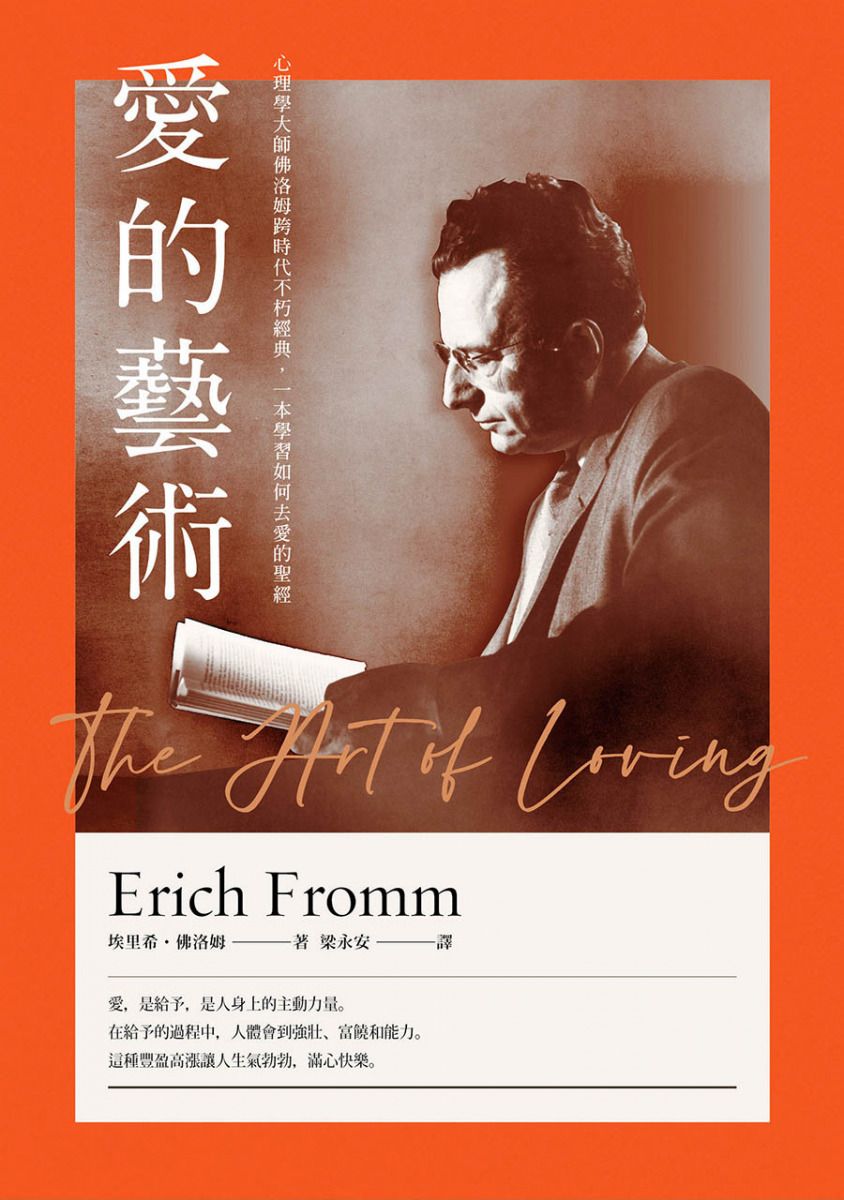
It is also because I have a bad temper, self-righteousness, and arrogance. I am fine in creation, but when it comes to my emotions, I hit a wall. The teacher also told me that it is one thing to talk about creation, and another to have a family. You cannot put the same personalities together.
These were all in the afternoon, within 2 or 3 hours, what Teacher Wu told me was completely unexpected to me. At the time, I was in my early 30s, and I thought I was a Rocker. It's also been 10 years now, and I totally understand what he's talking about. It also had a great influence on me later on.
➤Conscientious father & teacher, BUT I didn't want to listen to him when he broke his thoughts (Hey~)
Wu Yinning: Teacher Wu is a family-friendly father. When he was young and teaching, he mostly went to work during the day. At night, he went from riding a bicycle to riding a motorcycle, patrolling to see if the students were at home at night and whether they were studying well. If there is no night out to see students, it is usually reserved for his own creative time.
I don't know the status of his creations. But it can be seen that when he is free, he sits and writes, and the writing speed is very slow. He uses handwriting. In my impression, for example, after writing 500 words and 1000 words, he found a wrong word. If it was on the same manuscript paper, he would start from scratch. Virgo is really... In the documentary, he He used cutting, but in the earliest days, in the process of creating for many years, he rewrote all the wrong words.
I don't know what he said to Ada, but as a father, he sometimes even makes the child think that the father is too conscientious. He is very good at reciting and babbling, especially for Wu Zhining, because when he is reading, I don't want to listen (laughs).
➤PART5: Write articles about planting trees on paper, and plant trees in the fields
Zhou Fuyi: At present, in most of the documentaries of writers, it is relatively rare to see the aspect of a literary writer in the practice of social movements. "He's Still Young" tries to show the appearance of a writer's involvement in society. He does not only create, nor does he only stay in the study room. , more into the society, with the villagers to protect the land. Such writers are rare in Taiwanese society, and even outliers. Taiwanese society also needs not only literary creation, but also social action writers.
Wu Yinning: As Fu Yi said, Mr. Wu wrote and created by writing on paper. In fact, his life is also doing his creations on this land. For example, he writes about planting trees and creates articles about planting trees. In fact, he plants trees in the fields himself. His creations are closely related to real life. the above practice.
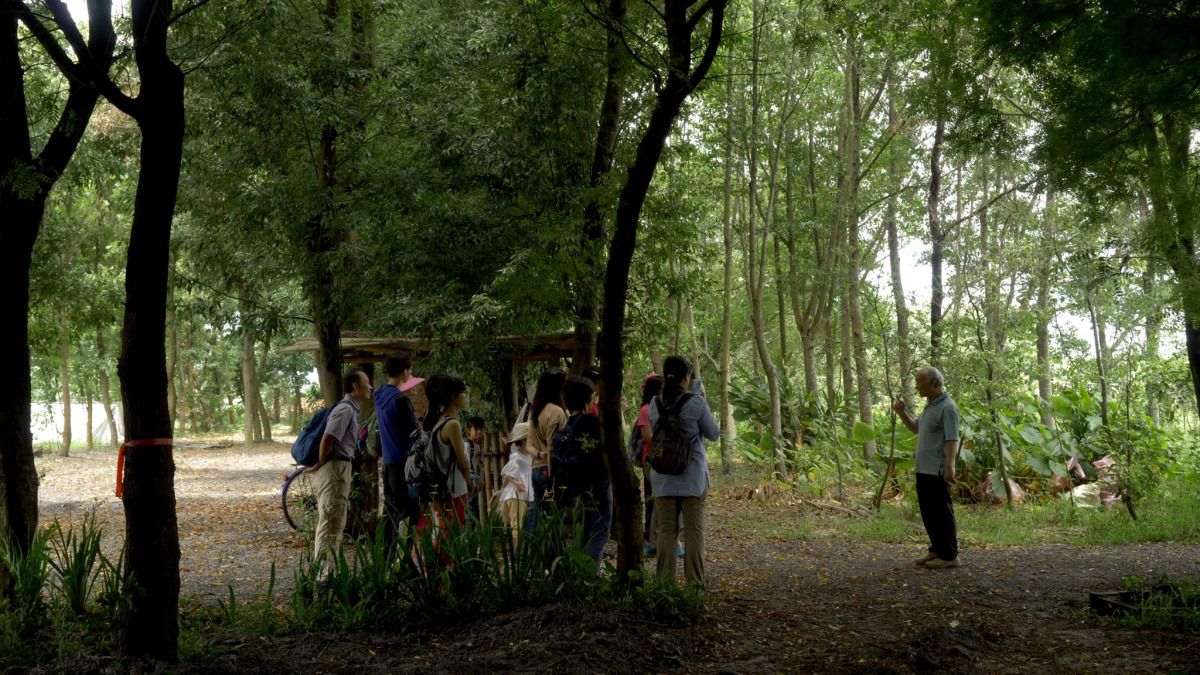
➤ Not only peasant poets, but also poets who "describe life"
Wu Jianliang: Tang poetry will be divided into factions, but does the realistic poet Du Fu not write romantic poems? Don't you write about landscapes and pastoral fields? Of course there are, but some aspects of the creation are relatively well-known. Rather than saying that Mr. Wu Sheng is a "peasant poet", it is actually just a label for identification. If possible, I think it is more comprehensive to say that Mr. Wu is a poet who "describes life". Because he lives in the countryside, on the west coast, and many things and scenes touch his heart, he has to speak out and present them through literary creation, so these hats seem to be fastened. In fact, these are just a part of life. He also writes about family, love, environmental protection, etc. These are also part of life.
Mr. Wu is also an advocate and intellectual who knows what contacts he has and can make good use of them. As mentioned just now, asking Ada to sing and Fuyi to hold activities, Mr. Wu himself is also in the literature circle, and he knows very well what resources can be combined with each other to create larger activities. Mr. Wu is not like modern people who are just keyboard participants in the cloud, who only leave messages and reposts on the Internet without people going to the scene: he is really willing to organize and pay for the environment he loves.
➤Creation and life are glued together, and creation must grow out of the land
Jiang Yuda: Mr. Wu's creation and life are glued together, which really has a profound impact on me. In the beginning, when the armed youth from rural areas first came out, because of the strong social movement character of the orchestra, I wrote songs for the movement at that time. There is also a lot of self-talk, contradictions and bottlenecks.
I have been observing Mr. Wu. He lives in his hometown and on the land. He is closely connected with the local people, things and things. . This is a direction I can take. This is also the reason why I moved back to Changhua Ershui from the city. I like the land in the countryside, and I like to live in a familiar environment.
7 or 8 years ago, Zhining asked me to record his works, spent the night at their house, and talked about a lot of things. Later, I directly said to him, "Please come back to Xizhou, please? Your father is creating works on his own land. I also hope that we can return to our own soil and grow our own things."
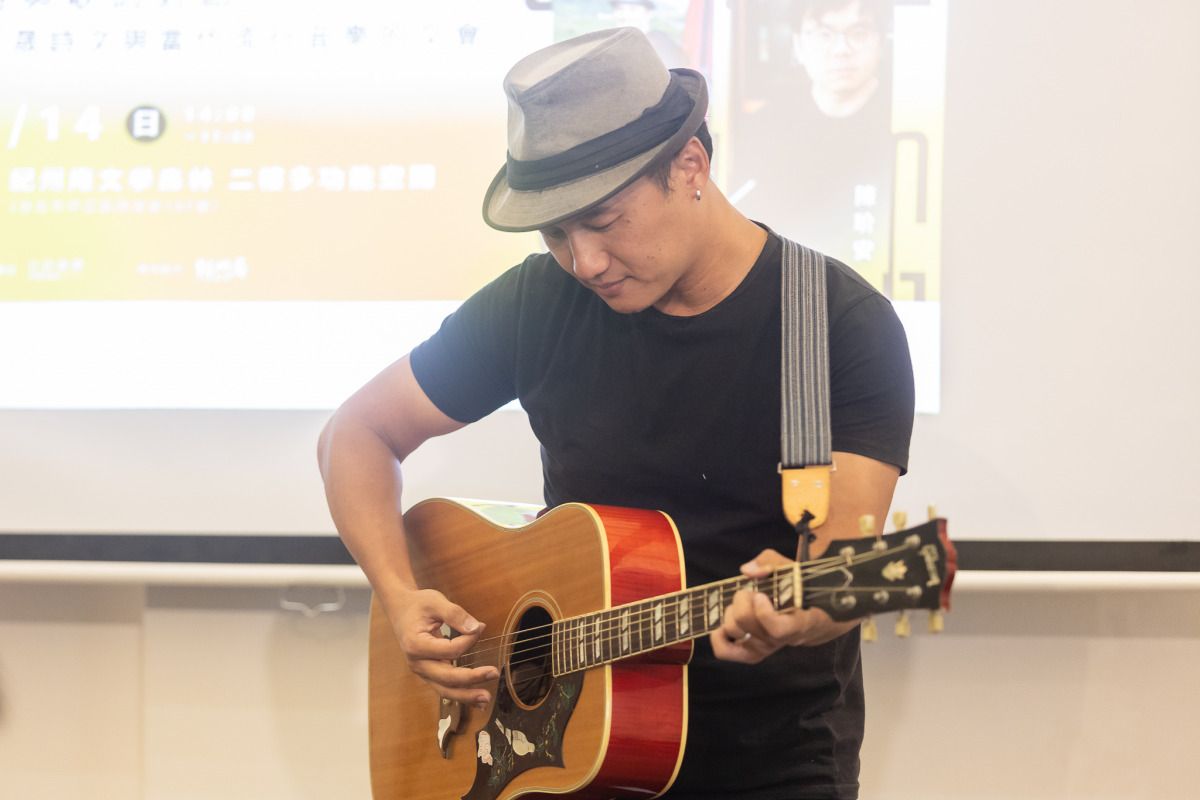
For the past 10 years, I have been thinking, how will the concerts of armed youth in rural areas develop? Mr. Wu is a pioneer. In the simplest way, he planted his body on the ground, lived a good life, found problems, and then wrote them down. This is one of the things that has affected me a lot in the past 10 years.
➤ From the rural past in the work to the present, is the rural area better?
Wu Yinning: In Mr. Wu’s works, we can see the rural areas he described in the 1960s, 1970s and 1980s, but we can also see that from the past to the present, there are several things that have not only been unresolved, but also remain unresolved. It keeps happening, even worse than we think.
The first is the urban-rural disparity. Considering the current global situation, the urban population is much larger than the rural population, and rural youth are constantly migrating to cities. Taking Taiwan as an example, the rural construction looks better, but the environment has not been solved, whether it is hydrology, soil, vegetation, or air, or even worse. Therefore, Mr. Wu has been thinking about planting trees in recent years. He believes that planting trees is the best solution he can think of. Every type of tree in one area can delay the acceleration of environmental degradation.
Second, the gap between urban and rural areas has not been resolved in terms of class, and the gap between the rich and the poor in urban and rural areas has also been widening. In the past, rural people could be turned over by studying, but now how many national universities and good colleges have rural experience and origin? The ratio has also become smaller. Therefore, these urban and rural areas, the gap between the rich and the poor, and environmental problems have actually become more severe over the years. This is why Teacher Wu is still worried at such an advanced age.
Teacher Wu has been planning to write a book on planting trees, why? Because after completion, he can use this book to promote the concept of planting trees, so that more people realize that this matter is really important. His creation, life and philosophy goals are completely consistent.
At that time, he will ask Zhou Fuyi to discuss how to promote tree planting, and tell the public sector that it is not necessary to have one air conditioner per classroom, but how many trees per campus. Then I asked Ada to come and write a song about planting trees, and proposed to leave more land for planting trees. I would also invite Jianliang to move forward in this direction in terms of poetry. That's what he is.
His creation is a path in his life. Life is his creation, and there is also a path that belongs to literature, which exists in this overall creation. ●( The original text was first published on the OPENBOOK website on 2022-08-23)
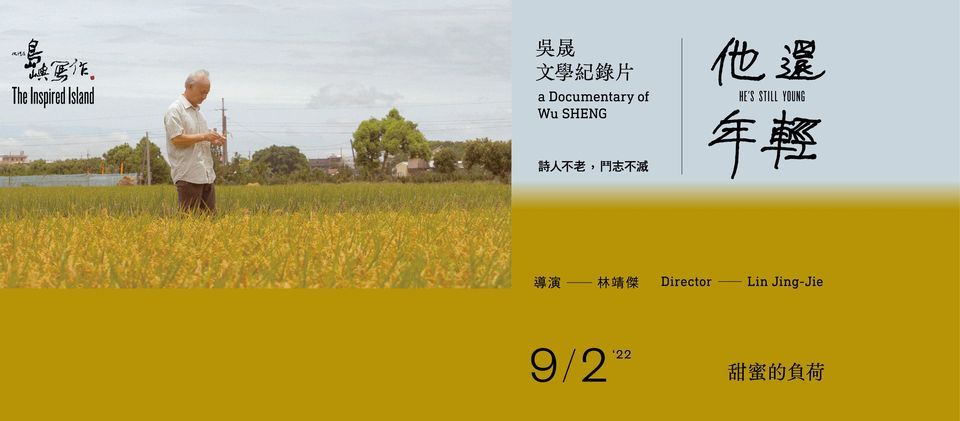
Like my work?
Don't forget to support or like, so I know you are with me..
Comment…